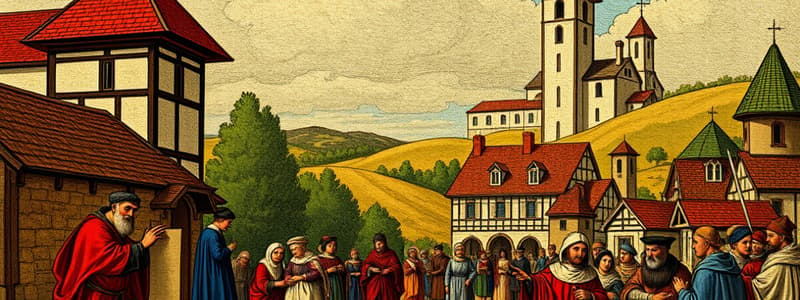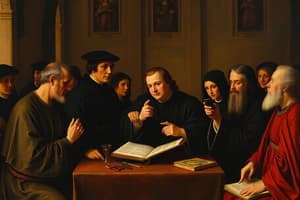Podcast
Questions and Answers
What was the Reformation the result of?
What was the Reformation the result of?
The Renaissance
What were the 4 causes of the Reformation? (Select all that apply)
What were the 4 causes of the Reformation? (Select all that apply)
- Religious Causes (correct)
- Cultural Causes (correct)
- Political Causes (correct)
- Economic Causes (correct)
What were the political causes of the Reformation?
What were the political causes of the Reformation?
Strong kings that were Calvinists and Lutherans did not follow the pope.
How did economic causes influence the Reformation?
How did economic causes influence the Reformation?
What were the presbyterians known for?
What were the presbyterians known for?
Where were the puritans primarily located?
Where were the puritans primarily located?
Who were the Huguenots?
Who were the Huguenots?
What was the significance of the Dutch Reformed?
What was the significance of the Dutch Reformed?
What impact did the Black Plague have on the church's authority?
What impact did the Black Plague have on the church's authority?
Who was John Wycliffe?
Who was John Wycliffe?
Who is known for nailing the 95 Theses to the church doors?
Who is known for nailing the 95 Theses to the church doors?
What did Martin Luther teach about the Bible?
What did Martin Luther teach about the Bible?
Who was Thomas More?
Who was Thomas More?
Who was Zwingli?
Who was Zwingli?
What were John Calvin's contributions to the Reformation?
What were John Calvin's contributions to the Reformation?
What did William Tyndale do?
What did William Tyndale do?
What is known about Henry the 8th?
What is known about Henry the 8th?
Flashcards are hidden until you start studying
Study Notes
Causes of the Reformation
- The Renaissance encouraged critical thinking about the church and scripture, leading to the Reformation.
- Four main causes of the Reformation: Political, Economic, Religious, and Cultural.
Political Causes
- Kings who embraced Calvinism and Lutheranism began to reject papal authority.
- Powerful monarchs sought independence from the Pope's influence.
Economic Causes
- Urban populations aligned with nationalistic sentiments, prioritizing allegiance to the king over the church.
- Citizens believed in paying taxes primarily to their king, emphasizing loyalty to their nation.
Key Groups and Locations
- Presbyterians emerged in Scotland, advocating for reform.
- Puritans arose in England and colonial America, emphasizing strict religious discipline.
- Huguenots were the Protestant community in France, facing persecution.
- Dutch Reformed churches flourished in the Netherlands, promoting Calvinist teachings.
Social Factors
- The Black Plague resulted in widespread death and war, diminishing public confidence in the church’s ability to fulfill spiritual needs.
- Disillusionment with church practices like indulgences contributed to the push for reform.
Influential Figures
- John Wycliffe, a Catholic priest, challenged church authority and translated the Bible into English, garnering followers known as Lollards.
- Martin Luther, after a lightning strike experience, became a theologian and famously nailed his 95 Theses to a church door, proclaiming the Bible as the ultimate authority over papal power.
- Luther’s ideas emphasized the importance of individual faith and accessibility to the New Testament for all.
Other Reformers
- Thomas More remained steadfast in his Catholic faith, contrasting with emerging Protestant ideologies.
- Ulrich Zwingli, influenced by Luther and Erasmus, led the Protestant movement in Zurich; he died in a religious conflict.
- John Calvin, initially a law student, became a prominent Protestant leader in Geneva, advocating that salvation comes through faith and teaching that all believers are priests without the need for intermediaries.
- William Tyndale translated the Bible into English in 1524 and faced martyrdom by being burned alive for his efforts.
Henry VIII
- A significant figure who initiated the English Reformation due to political and personal motivations, famously known for his six marriages and the establishment of the Church of England.
Studying That Suits You
Use AI to generate personalized quizzes and flashcards to suit your learning preferences.




